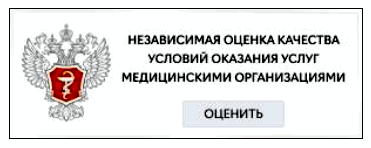Объявления
-
Памятки «Навигатор профилактики», разработанные Московским...
Уважаемые преподаватели и кураторы ФГБОУ ВО ДГМУ Минздрава России! В дополнение к ранее направленному письму от 13 октября 2022 г. № 06-14207/09-18/22 и в...
13.12.2022
2088
-
Выборы на замещение следующих должностей по срочному...
ДГМУ объявляет выборы на замещение следующих должностей по срочному трудовому договору, в связи с истечением срока избрания: список...
22.07.2024
105
-
III Всероссийская конференция «TED-Medical»
Дагестанский государственный медицинский университет приглашает членов СНО/СНК ДГМУ и других ВУЗов Российской Федерации, а также учащихся...
16.07.2024
346
-
Объявлен прием заявок на IX Всероссийский конкурс...
Открыт прием заявок на IX Всероссийский конкурс научно-исследовательских работ студентов и аспирантов Российских образовательных организаций...
08.07.2024
108
-
Осторожно, мошенники!
Уважаемые коллеги и обучающиеся! Хочу обратиться ко всем вам в связи с распространением в мессенджере Телеграмм сообщений мошеннического...
03.07.2024
117
-
Список научных и педагогических сотрудников, относящихся к...
Список ППС
02.07.2024
243
-
Как вести себя при обстреле
25.06.2024
128
-
Телефон для приема сообщений о коррупционных проявлениях:
68-32-80
-
Эл. почтовый ящик:
Ubdgmu@mail.ru
Department of public health and health service
01.07.2021
248
Head of the Department of Public Health and Health Service of Dagestan State Medical University, M.D., Professor.
Address: 44 Shamil Avenue
Telephone: +7 (8722) 63-12-46
E-mail: luiza_agalarova@mail.ru
Mobile phone: 8 (960) – 409 – 45 – 97
History of the Department of Public Health and Health Service.
In the first years of the Institute’s operation, the course of health organization was part of the Department of General Hygiene. This course was headed by M. G. Kumaritov, People’s Commissar of Health of the DASSR, from 1936 to 1937, and O. V. Baroyan, Deputy People’s Commissar of Health of the DASSR, from 1937 to 1940. In 1940, an independent department of health organization was established. Associate Professor K. B. Shaevich was elected head of the department. During the Great Patriotic War, classes at the department temporarily stopped and were resumed in 1946. Since 1950, a course on the history of medicine has been introduced into the curriculum of the department.
In 1958, the department was reorganized into a course. Associate Professor V.V. Kyshtimov was elected as the head of the course. V.V. Kyshtimov wrote a remarkable monograph “History of the origin and development of the Dagestan State Medical Institute (1932-1967)”.
In 1965, Candidate of Medical Sciences Ya.I. Golin, Deputy Minister of Health of the DASSR, was elected head of the course of the health organization. In 1968, the Department of Social Hygiene and Health Organization was organized on the basis of the courses of Social Hygiene and the History of Medicine. From 1965 to 1991, the department was headed by Professor Ya. I. Golin. For a quarter of a century of work at the department under his leadership, 2 doctoral and 18 candidate dissertations were defended.
The course of the history of medicine after V.V. Kyshtimov was headed by the Assistant Professor of the department S.V. Atarian, and since 1990 – Associate Professor F.M. Osmanov. From 1991 to 1993, the department was in charge of M.M. Asadulaev. In 1993, Associate Professor N.M. Madiyev served as head of the department. He is one of the founders and the first dean of the Faculty of Continuing Medical Education.
From 1994 to the present, the Department is headed by M.D., Professor Rashid Seifievich Hajiyev.
In different years, the following people worked at the department: M. G. Kumaritov – People’s Commissar of Health of the DASSR; O. V. Baroyan — Deputy People’s Commissar of Health of the DASSR; Associate Professor K. B. Shaevich; assistants: A. N. Mananchikova, D. D. Gadzhiev, D. K. Rosen, R. S. Alikishiev, E. A. Nogaeva; associate professors V. V. Kyshtym, N. M. Madiev, P. G. Shaturin, A. E. Zadkin; Professor Ya. I.Golin; associate professors S. V. Ataryan, M. M. Asadulaev; G. Ya. Lashtaeva, R. S. Shamsudinov, V. I. Ivanova, L. M. Askhabova, A. A. Sidalieva.
In 1996, the Department of Social Hygiene and Health Organization was renamed the Department of Social Medicine, Management and Health Economics, in 2000 to the Department of Public Health and Health, and in 2016 to the Department of Public Health, Health Service and Economics.
The priority directions of the department are: introduction of modern educational and information technologies into the educational process; development and implementation of a system for monitoring, quality control of training and mastering practical skills; introduction of flexible learning models; strengthening the role of the teacher in organizing independent work of students; activation of students ‘ participation in research.
Much attention is paid at the department to research work and the implementation of research results in practice. The main directions of scientific research: the effectiveness of the use of health resources; quality management of medical care; a comprehensive study of the health of the population of the republic; the study of lifestyle and health of the population; scientific foundations of health management; the study of the quality and effectiveness of preventive activities of medical institutions; the history of healthcare in Dagestan and DSMU.
Over the past 5 years, all employees of the department have prepared and published 275 articles in journals and collections, including 48 in peer-reviewed journals.
The department has a student scientific circle, whose members constantly make presentations at university and interuniversity conferences. Students of the 1st-2nd courses participate in the collection of material about outstanding medical scientists of Dagestan, 4-5 courses in the collection of material on a comprehensive socio-hygienic study of students of DSMU. In addition, each student of 1-2 courses under the ERWS line performs a course work on the problem: “The moral image of a doctor”, which includes more than 30 topics. Over the past 3 years, 20 students have participated in the research work, 11 scientific papers have been published. The members of the circle performed at All-Russian conferences and Olympiads in Ryazan, Kazan, Perm and won prizes.
Teaching staff.
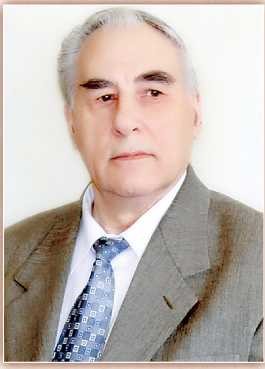 Rashid Seifievich Hajiyev – Head of the department since 1994, Doctor of Medical Sciences, Professor, Honored Scientist of the Republic of Dagestan, Honored Doctor of the Russian Federation, academician of the International Academy of Sciences. R. S. Hajiyev is a member of the editorial boards of Russian medical journals: “Zemsky doctor”, “Public Health and Healthcare”, “General Practitioner’s Handbook”. Under the leadership of Professor R. S. Hajiyev, 4 doctoral and 35 candidate dissertations were defended, he published 487 scientific papers, including 15 monographs, 7 textbooks, 105 articles in peer-reviewed journals of the Higher Attestation Commission.
Rashid Seifievich Hajiyev – Head of the department since 1994, Doctor of Medical Sciences, Professor, Honored Scientist of the Republic of Dagestan, Honored Doctor of the Russian Federation, academician of the International Academy of Sciences. R. S. Hajiyev is a member of the editorial boards of Russian medical journals: “Zemsky doctor”, “Public Health and Healthcare”, “General Practitioner’s Handbook”. Under the leadership of Professor R. S. Hajiyev, 4 doctoral and 35 candidate dissertations were defended, he published 487 scientific papers, including 15 monographs, 7 textbooks, 105 articles in peer-reviewed journals of the Higher Attestation Commission.
 Luiza Saidakhmedovna Agalarova – Doctor of Medical Sciences, Associate Professor, has been working at the department since 2012. Author of 275 scientific papers, including 57 articles in peer-reviewed journals of the Higher Attestation Commission, 19 textbooks and 3 monographs. Under the leadership of L. S. Agalarova, 2 candidate dissertations were defended, the scientific supervisor of 3 candidate dissertations. Scientific topics — “Fundamentals of family medicine”, “Quality of medical care”.
Luiza Saidakhmedovna Agalarova – Doctor of Medical Sciences, Associate Professor, has been working at the department since 2012. Author of 275 scientific papers, including 57 articles in peer-reviewed journals of the Higher Attestation Commission, 19 textbooks and 3 monographs. Under the leadership of L. S. Agalarova, 2 candidate dissertations were defended, the scientific supervisor of 3 candidate dissertations. Scientific topics — “Fundamentals of family medicine”, “Quality of medical care”.
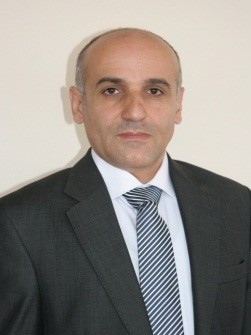 Alisker Narimanovich Hasanov – Associate professor of the Department, Candidate of Medical Sciences, has been working at the department since 2008. Author of 100 publications, 9 textbooks. The main scientific topic is the medical examination of the children’s population. Since November 2019, Head of the educational part of the department
Alisker Narimanovich Hasanov – Associate professor of the Department, Candidate of Medical Sciences, has been working at the department since 2008. Author of 100 publications, 9 textbooks. The main scientific topic is the medical examination of the children’s population. Since November 2019, Head of the educational part of the department
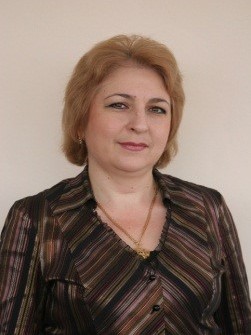 Zarema Nazhmudinovna Aivazova — Assistant of the Department, Candidate of Medical Sciences, has been working at the department since 2002. Author of more than 100 publications, 7 textbooks. The main scientific topic is the study of public health. She is working on a doctoral dissertation.
Zarema Nazhmudinovna Aivazova — Assistant of the Department, Candidate of Medical Sciences, has been working at the department since 2002. Author of more than 100 publications, 7 textbooks. The main scientific topic is the study of public health. She is working on a doctoral dissertation.
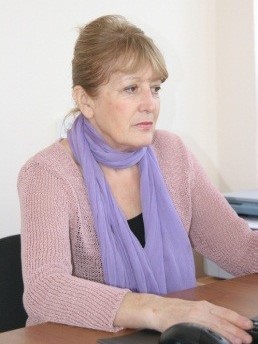 Fiala Magomedovna Osmanova – Associate Professor of the Department, Candidate of Medical Sciences, Honored Worker of Education of the RD. Member of the editorial board of the journal “Bulletin of DSMU”, author of more than 140 publications, 10 textbooks; co-author of 6 books dedicated to the anniversaries of DSMU.
Fiala Magomedovna Osmanova – Associate Professor of the Department, Candidate of Medical Sciences, Honored Worker of Education of the RD. Member of the editorial board of the journal “Bulletin of DSMU”, author of more than 140 publications, 10 textbooks; co-author of 6 books dedicated to the anniversaries of DSMU.
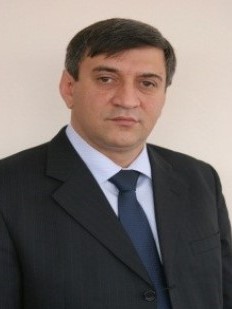 Parazhitdin Azimovich Murzaev — Assistant of the Department, Candidate of Medical Sciences, has been working at the department since 2008. Author of about 70 publications and 5 textbooks. Teaches the history of medicine and the organization of healthcare.
Parazhitdin Azimovich Murzaev — Assistant of the Department, Candidate of Medical Sciences, has been working at the department since 2008. Author of about 70 publications and 5 textbooks. Teaches the history of medicine and the organization of healthcare.
 Leila Adilgereevna Hajiyeva — Assistant of the Department, Candidate of Medical Sciences, has been working at the department since 1994. Author of more than 90 publications, 3 monographs, 10 textbooks. She has been a member of the DSMU Trade Union Committee for more than 20 years.
Leila Adilgereevna Hajiyeva — Assistant of the Department, Candidate of Medical Sciences, has been working at the department since 1994. Author of more than 90 publications, 3 monographs, 10 textbooks. She has been a member of the DSMU Trade Union Committee for more than 20 years.
Subjects taught at the department:
• Public Health and Health Service, health economics
• Public Health and Health Service
• Management basics
• Health economics
• Management, health economics in dentistry
• The basics of general medical practice
• History of medicine
• The history of pharmacy
THE MAIN DIRECTIONS OF SCIENTIFIC
ACTIVITIES OF THE DEPARTMENT
• Comprehensive study of public health.
• Exploring the effective use of labour and material resources in health care.
• Medical civic assistance study.
• Study of preventive activities of medical organizations.
• Economic analysis of the activities of medical organizations.
• Primary health care.
STUDENT SCIENCE CIRCLE
Regulations on the Student Scientific circle of the Department of Public Health and Health Services
1. General provisions
- Student science circle (SSC hereinbefore and after) of the Department of Public Health and Public Health is one of the forms of scientific activity of students, aimed at expanding the scientific potential and forming the skill of research activity among students in their free time.
- SSC is created on a voluntary basis. The name of the SSC is the Student Science Circle.
- Every university student who regularly attends SSC meetings is considered a member of the SSC.
- The organization of the SSC activities is carried out by the head of the SSC.
- The activities of the SSC are carried out on the basis of this Regulation.
2. SSC’s goals and objectives
The main goal of the SSC is to create and develop favorable conditions for the formation of specialists by intensifying the research activities of students, providing an opportunity for each student to realize his right to creative personal development in accordance with his abilities and needs.
The main objectives of the SSC’s activities are:
– assistance in improving the level of scientific training of students;
– improving the quality of professional training of young specialists;
– creating conditions for the formation of creative activity;
– assistance to students in independent scientific search and organizational support of their scientific work;
– conducting scientific and practical research and scientific and practical events on the subject of research and development of the department.
3. SSC organizational work
- The scientific management of the SSC is carried out by a teacher of the department, recommended by the head of the department.
- The SSC holds meetings at least once a month.
- The Secretary of the SSC is elected from among the students who are members of the SSC by open voting. The candidate who has received the largest number of votes of the SSC members present is considered elected. The Secretary of the SSC is elected for a term of one year and may be re-elected ahead of schedule in case of missing more than two meetings of the SSC without a valid reason.
- The secretary of the SSC carries out its activities in the following areas:
– draws up, together with the scientific director of the SSC, the work plan of the circle for the year and the agenda of each meeting;
– contributes to the timely implementation of the scientific work plan by the members of the SSC;
– organizes meetings of the SSC;
– informs the members of the SSC about the meeting of the SSC no later than 3 working days in advance using e-mail, mobile phone. - Records of the SSC activities are kept at the department.
- The meetings of the SSC are held in accordance with the plan.
- SSC meetings can be held in various organizational forms: hearing and discussion of student scientific papers of SSC members, scientific debates.
- Members of the SSC, students of other departments invited by the scientific supervisor can participate in the meetings of the SSC, make reports.
- At the end of the meeting of the SSC, the secretary draws up the minutes of the meeting of the SSC, which indicate: the date and place of the meeting, the agenda of the meeting; the full name of the speaker and the members of the SSC who were present at the meeting, the scientific supervisor (supervisors) SSC, topic of the report (s)
- The protocol is signed by the secretary and the scientific supervisor of the SSC.
- The minutes of the meetings of the circle are stored at the department.
- Every year, a report on the activities of the SSC is compiled until June 25.
4. Reports presented at the SSC meeting
- Reports successfully defended at the SSC meeting, on the recommendation of the scientific director of the SSC, can be published on the university’s website, in a collection of scientific articles, and can also be recommended for publication in other editions.
- The report is evaluated by the scientific supervisor of the SSC, the head taking into account the opinion of the members of the SSC.
- The categories of evaluation of the report are: the scientific value of the work, the quality of the presentation of the material and the design of the work. The assessment of the scientific value of the work carried out implies an assessment of the report as to how relevant the research topic is and what practical significance it has, whether it contains elements of scientific novelty and what is the scope of the research conducted by the author.
- The report is evaluated according to the system: recommend (not recommend), recommend to finalize for further presentation at internal or external scientific conferences and competitions.
